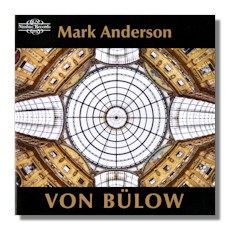
The Internet's Premier Classical Music Source
Related Links
- Latest Reviews
- More Reviews
-
By Composer
-
Collections
DVD & Blu-ray
Books
Concert Reviews
Articles/Interviews
Software
Audio
Search Amazon
Recommended Links
Site News
 CD Review
CD Review
Hans von Bülow

Works for Piano
- Ballade, Op. 11
- Ballabili e Intermezzi "Carnevale di Milano", Op. 21
- Impromptu "La certa", Op. 27
- Marche héroïque d'apres des motifs hongrois populaires, Op. 3
Mark Anderson, piano
Nimbus NI5876 69:30
Hans von Bülow (1830-1894) was a key figure in 19th-century German music. Born in Dresden on 8th January 1830, the young Hans began learning to play the cello at the age of nine. He later started piano lessons with Cacilie Schmiedel and later with Clara Schumann's father Friedrich Wieck. Further studies took him to Leipzig and Stuttgart, where he met Joachim Raff, who was to become his lifelong friend.
The seminal experience of hearing Franz Liszt conduct the premiere of Wagner's "Lohengrin" at Weimar in 1850 induced von Bülow to discard a career in law and devote all his energies to music. From then on he championed Wagner indefatigably, and in 1865 and 1868 he conducted the premieres of "Tristan und Isolde" and "Die Meistersinger von Nurnberg" respectively. He so admired the master, that even when his wife Cosima (Liszt's daughter), whom he had married in 1857, left him for the more famous man, he did not utter a word. In 1875 he premiered Tchaikovsky's First Piano Concerto dedicated to him, and it was von Bülow himself who dubbed Brahms' First Symphony "Beethoven's Tenth", an accolade the composer somewhat disliked.
Apart from being a fine and rigorous conductor, von Bülow was also a renowned teacher, his most famous pupil being Richard Strauss. His piano works are technically demanding and offer ample opportunity for the soloist to shine, all this a result of the piano lessons he took with Liszt way back in 1851. Indeed, this experience left such a profound effect on von Bülow's approach to the instrument, that even Liszt remarked that "his executive talent will easily place him in the first rank of the greatest pianists."
The four pieces on this superb issue not only highlight the versatility of the composer, but also the melodic fluency, harmonic invention and formal command with which von Bülow was blessed. Written in 1871, the "Carnevale di Milano" is the most substantial piece on the programme. Dedicated to the ballerina Elvira Salvioni, the Suite comprises a sequence of ten dances and intermezzos depicting various aspects of Elvira's stage persona. Overflowing with colour and dance rhythms, the piece demonstrates the composer's skill at taking a genre piece and infusing it with his own brand of humour and vigour. The final fiery Galop is a fine example of von Bülow's breadth and variety of his keyboard writing.
The 1854 Ballade is, maybe, the next most important piano piece in the composer's keyboard repertoire, and although it contains echoes of Wagner and Liszt, it firmly confirms an individual sound-world and evolves through its own persuasive logic. The two remaining miniatures highlight the composer's acumen to etch short descriptive ideas with superb craftsmanship.
Mark Anderson is a passionate advocate of this music, and his performances are consistently stylish and perceptive. This music is an emphatic statement from a musician more famous for his conducting than his composing. If you want to embellish further your CD collection, don't miss out. A peach of an issue in first-rate sound and presentation.
Copyright © 2012, Gerald Fenech



















